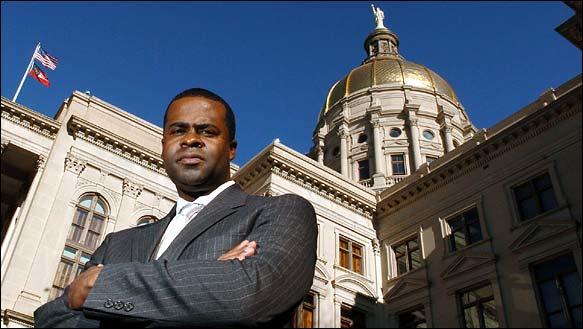
Section Branding
Header Content
Atlanta Mayor Kasim Reed: Mayors Have A Reality That People In Washington Don't Have Every Day
Primary Content

Atlanta’s mayor Kasim Reed has a lot of thoughts about the future of cities.
July 8, The Wall Street Journal published Reed’s thought’s on the future of cities as global leaders:
This week on “Political Rewind”, GPB’s Bill Nigut sat down with Mayor Reed to talk about that Wall Street Journal piece, the power of local governments, and the future of crime prevention.
Interview Highlights:
BILL NIGUT, GPB News : I think you have given me a really good blueprint for conducting this interview. Because you were asked to contribute your thoughts to The Wall Street Journal’s anniversary edition. You say something really interesting off the bat. You say:
“I often say that cities are where hope meets the street, and that will be increasingly true between now and 2050.
Cities, in short, are ascendant. National governments—in the U.S. and overseas—are all but broken and hold little promise for mending themselves in the future”
KASIM REED, Mayor of Atlanta: I think that that’s the case. I said cities are where hope meets the street because increasingly, people bring their dreams to cities. It’s where more than 70 percent of the country’s GDP is. And in our metros is where 70 percent or more of our population is. So, if you want a healthy United States of America, our cities are going to have to be healthier and stronger. Fortunately, people across the age spectrum are choosing cities. Young people are choosing cities overwhelmingly and our baby boomers are deciding after all of these years living outside of the heart of metro Atlanta to move back into cities. So it’s really a very nice convergence of events.
BILL NIGUT: But you’re also suggesting it's cities where the political process will unfold in a more positive way? At least, that’s how I interpret what you're saying.
KASIM REED: That’s a correct interpretation. Mayors are continuing to enjoy bipartisan support. And can get things done on a bipartisan basis because potholes don’t have party affiliation, nor do jobs, nor do new businesses. Nor do police officers. Nor do firefighters. We have a reality that people in Washington don’t have every day, because we see our constituents and the contact is more direct, more in your face, and close. And so, I think that business leaders in America and around the world are making a decision that they are better off interacting with leaders of 50 to 75 largest metros, than they are trying to function at the national level. This isn’t true just in the United States. This happens to be true around the world. National governments globally are not responsive. They are slow. And business and individuals at home are getting fed up. It’s where the action is going to be.
BILL NIGUT: You make, I think, one relatively provocative statement in the piece for The Wall Street Journal. You talk about crime prevention.
You say:
“In the end, our efforts to reduce crime will depend on how much privacy we’re willing to sacrifice. Accordingly, we will need thoughtful public discussions about how to balance privacy with the desire for safety.”
Are you suggesting that perhaps we do have to sacrifice some privacy rights, or are you putting it on the table for discussion?
KASIM REED: I’m putting it on the table to have a conversation. I mean, Bill, I don’t want to scare you. But, between now and 2050, if you live in a major metro, I’ll be able to have eyes on you. Between the cameras that we’ll install and between your mobile phone, if you desired for me to and were completely comfortable with me tracking your movement, by 2050, in fact, we would be able to put eyes on you and to locate you through your cell phone and through cameras for about 80 percent of the time you were moving around.
BILL NIGUT: When you say “we” do you mean the government?
KASIM REED:I mean the government. And it would have to be a choice.





